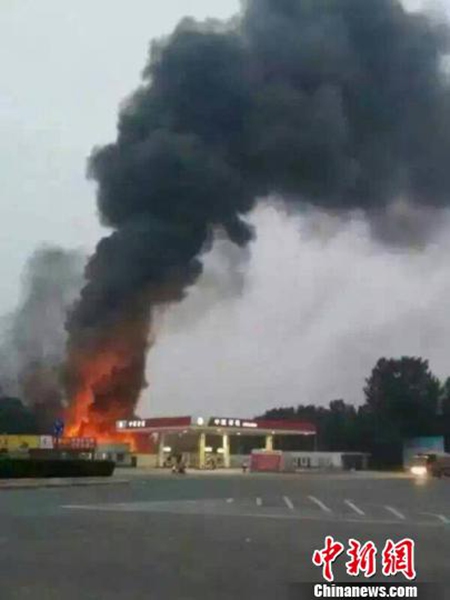Tragedy highlights plight of left-behind elderly
By Fang Zhou (China Daily) Updated: 2015-05-28 07:49
 |
|
Fire breaks out in a nursing home at Sanlihe village of Lushan county in Pingdingshan city of Central China's Henan province on Monday.[Photo/chinanews.com] |
A fire that engulfed a privately run nursing home for the elderly in Central China's Henan province on Monday night, killing 38 people and injuring six others, two of whom are in a critical condition, has once again revealed the poor care-providing system for senior people in many parts of the country, especially in its impoverished rural areas.
According to media reports, the nursing house in a village in Lushan county, which was home to 51 local elderly residents, was made of iron sheets with flammable foam board as filling. According to survivors, the rest home was short of staff, especially at night.
The final cause of the accident is yet to be investigated, but the exposure of the poor conditions of the makeshift structure, undoubtedly means it was a huge safety hazard. And surely the conditions increased the difficulties for anyone inside trying to escape and those outside trying to rescue them.
The existence of such a firetrap shows the local authorities' indifference to the elderly who need looking after.
Following the accident, President Xi Jinping and Premier Li Keqiang expressed their concern and demanded all-out medical treatment be extended to the wounded, investigations be made into the accident's cause and those responsible be held accountable according to the law. The Ministry of Civil Affairs has sent a team to deal with the aftermath of the tragedy and required all subordinate agencies to make safety checks on such care homes to prevent any similar accidents in the future. A police investigation into the cause of the disaster is also underway.
All such after-event moves, which to a large extent are regular procedure, are necessary. However, the punishment of any found responsible for these deaths is not the only outcome people want. The public earnestly hopes that this deadly incident will prompt the authorities to pay enough attention to the plight of the country's large number of senior people and take practical measures to promote improvements.
The Lushan incident is only the latest in a number of deadly nursing homes accidents that have occurred across the country in recent years. Incomplete statistics indicate that at least 14 deadly incidents have resulted in the deaths of seniors living in nursing homes over the past two years, including fires, wall collapses and violence against seniors. In July 2013, a nursing home for the elderly in Hailun city, in Heilongjiang province, was set on fire by one of its residents who had a personal feud with another, which killed 11 and injured two others. There have also been sporadic media reports about the elderly in care homes being physically abused by the staff.
The frequent occurrence of such incidents involving nursing homes for the elderly is likely to continue unless the government pays more attention to the elderly.
China cannot afford to ignore the needs of its elderly population, given that it continues to grow as society ages. Statistics indicates China's aging population accounted for 15.5 percent of the total population by the end of 2014, and is it expected to further rise to 30 percent by 2050. According to the national committee for senior citizens' work, the number of people above 60 exceeded 200 million in 2013. The Ministry of Civil Affairs data also shows that people above 65 who are "left behind" while their children seek work elsewhere will be more than 51 million by the end of 2015. Yet, the latest figures show China had only 32,000 registered homes for senior citizens by the end of March and around 220,000 care givers, compared with 10 million who are needed.
The frequent tragedies involving nursing homes for the elderly have underscored the country's need to be more prepared for its aging society, in terms of both facilities and services.
The author is a senior writer with China Daily.
(China Daily 05/28/2015 page9)

I’ve lived in China for quite a considerable time including my graduate school years, travelled and worked in a few cities and still choose my destination taking into consideration the density of smog or PM2.5 particulate matter in the region.











